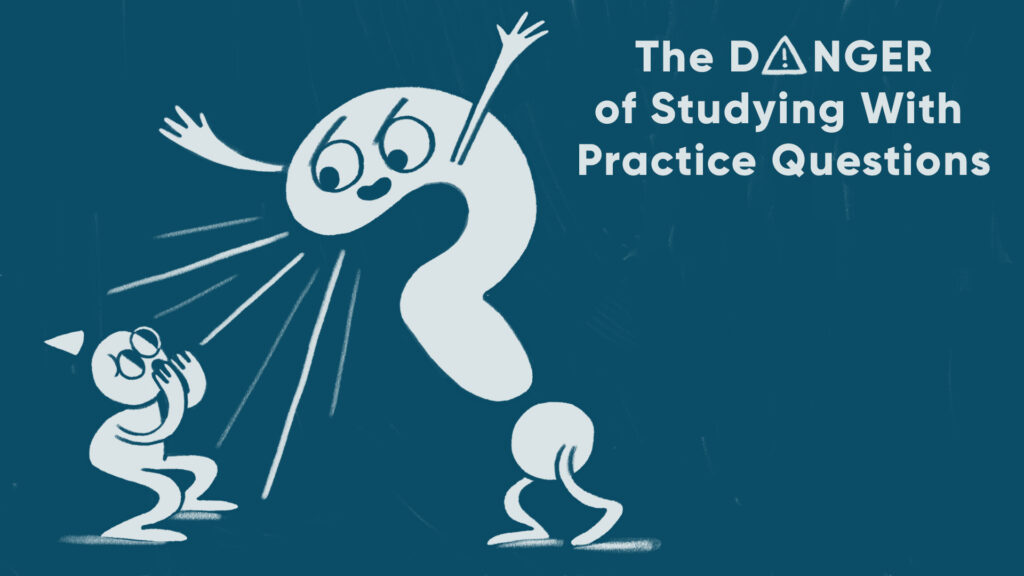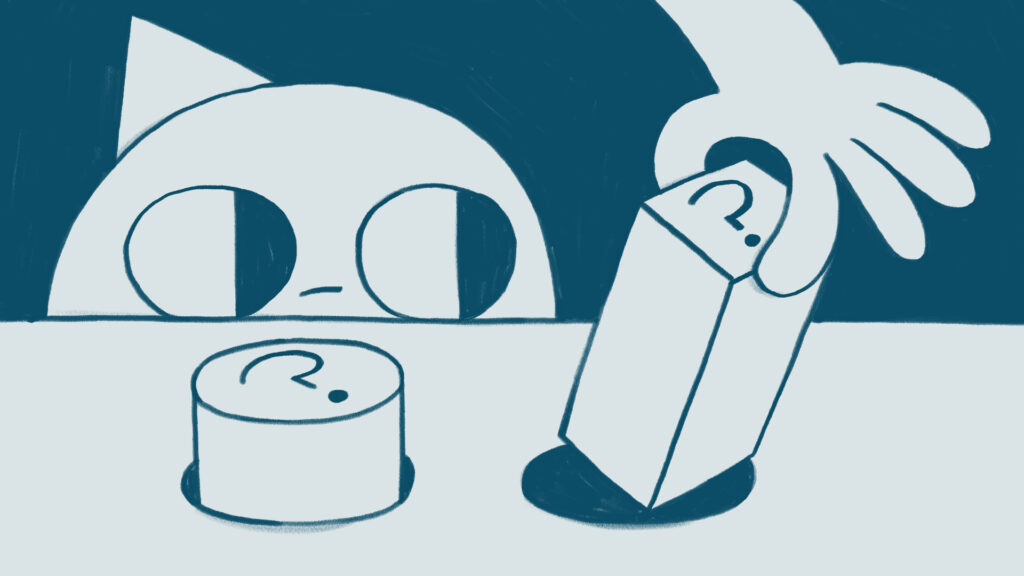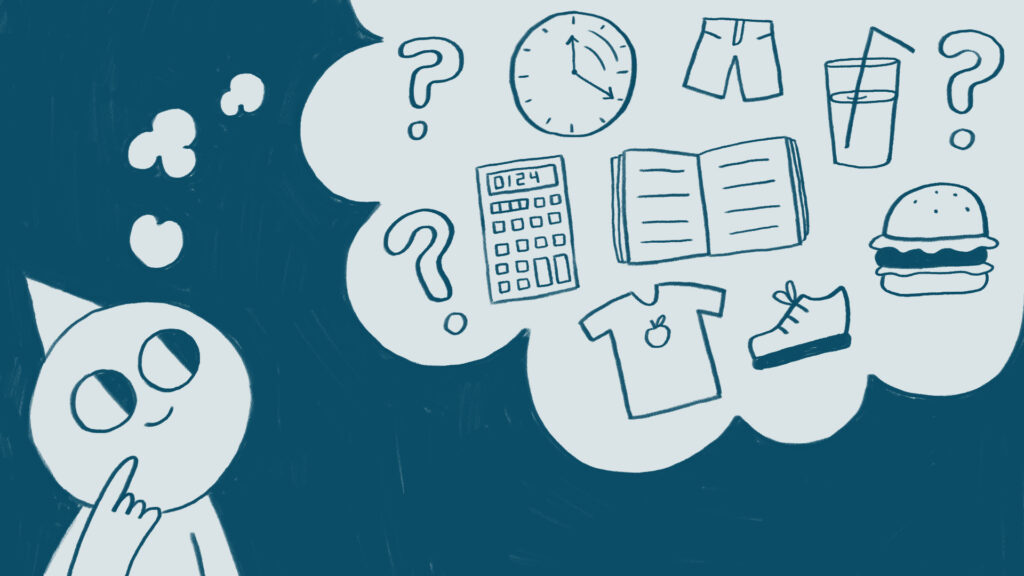How to Properly Utilize Practice Questions12 min read

Most people are using practice questions all wrong, which is a big problem because practice questions are the most effective study strategy you can use. This form of active recall has the best evidence in academic journals and is the most commonly used study technique of top students. Practice questions increase your exam scores more than any other method if used properly.
However, if you are using it incorrectly, your scores will not go up, but they might go down (like what happened to me). This is because only certain practice questions should be used at a certain time, in a certain way, and after a certain amount of pre-studying.
Here are eight mistakes (and how to fix them) that most people make when using practice questions.
What are Practice Questions
Practice questions mimic the questions you will receive on the examination, test, quiz, report, or any other form of testing. These can be questions from the back of your textbook, the teacher, the internet, or self-created.
The Research
One study looked at over 100 sources and 10 study techniques. They gave techniques the rating of “high utility, medium utility, or low utility.” Only three were rated “high utility,” and the rest were rated low or medium utility.1 Those three techniques were active recall, interleaved practice (spaced repetition), and practice testing.
Another experiment took 324 undergraduate students and surveyed their study habits, and correlated those habits to GPA. 85% of the students with a GPA of 3.7-4.0 reported using practice questions, while only 65% of students with the lowest GPA of 1.7-2.1 reported using practice questions.2

Finally, one study looked at pharmacy students and compared their performance when rewatching lectures vs. retrieval practice (practice questions); they concluded:3.
Testing may be more efficient (ie, cost-effective) for long-term performance. Students who attend class may want to avoid rewatching course recordings in favor of practice testing.
Palmer et al.
The evidence consistently points to practice testing being one of the most effective methods for studying when used right. So, what mistakes do people make when using practice questions?
1. Starting Too Early
When I first started medical school, I wanted to be the best student. I bought question banks, textbooks, and every resource I could get my hands on. I tried my first question during week one, “Which is the drug for treating a disease characterized by Reed-Sternberg cells that has the common side effect of dilated cardiomyopathy?” I was lost, this was a three-step question, and I didn’t even know who this Reed-Sternberg guy was. I knew nothing about drugs, treatments, side effects, or disease states. I started too early.
Like any form of active recall, including practice questions, self-testing, teaching, or anything, you must have a basic understanding of the topic before you begin testing yourself.
If we remember Bloom’s Taxonomy of learning, it goes: Remembering → Understanding → Applying → Analyzing → Evaluating → Creating, and I wasn’t even at the Remembering phase yet when I tried my first practice question.
Stupidly, however, I kept blasting through questions at a wasteful clip. I just didn’t know enough medical diction or medicine in general for questions to make sense. All that time was wasted. Make sure you have a basic understanding of the topic before you begin practice questions. If you don’t understand two or more words in the question, you have started too soon.
2. Using the Wrong Ones
I understand exactly why and for what I am doing these practice questions. If I have one math chapter covering differential and partial differential equations. Still, my test is only on differential equations, then doing all the questions in the back of the chapter is a massive waste of time for the upcoming exam.
If I am going through a question bank online that includes topics on the anatomy of the heart, but I will only be tested on the histopathology of the heart, I am wasting time.

Make sure you are using the correct practice questions for your purpose. Feel free to ask your teacher, are the practice questions relevant practice questions to what you are studying and will be tested on?
3. Starting Hard
Most textbook practice questions are organized from easy to difficult for a reason. When you start practicing questions about a specific topic, start with the easy ones. This will help build confidence, knowledge, and flow for when you want to start tackling the more difficult questions.

Then, depending on how you will be tested, continue to work through questions in that way. For example, I remember in high school, we would be tested with easier questions and end up with harder questions, so I would always plan my practice questions, to begin with, easier questions, and then end with harder questions. In medical school, however, the questions are mixed, so after I have built up some confidence with a set of easy questions (when I am first learning the topic), I don’t move onto only hard questions but mixed sets of questions to mimic test day.
4. Looking at The Answers
When you are going through your practice questions, do you answer a question and then immediately look at the answer or do a couple of questions and then all the answers, or look at the question and answer before attempting the question? Only one of those three options is awfully bad, and that’s the third option.
In one fantastic study, students were tested after studying in three different ways: practice questions and feedback, practice questions and no feedback, or simply restudying the material.4 Guess what? The students who were tested with no feedback, so no answers, scored significantly higher on the final testing of the material than those who restudied the material. So, even if you never see the correct answer, your performance after practicing with some questions significantly improves.
Testing is a powerful way of improving learning, and schools know this. Improved learning is one of the main reasons students are given exams. Of course, for assessing how they are doing, but also to improve their learning.
Sorry for that tirade, but you are destroying the whole point of practice questions if you look at the answers before having an attempt. I remember, sometimes, questions would seem impossibly hard, so much so that I wanted to skip them and look at the answer. Avoid that urge. Have a real attempt.
In regards to doing a bunch of questions and then looking at the answers or looking at them one-by-one, the question then answer, the question then answer, I prefer to do the latter technique when I am first learning the material and the former technique when I am coming close to test day.
5. Not Mimicking Test Day
Why do I do a bunch of questions in a row as I approach test day? Because it mimics test day. Also, in medical school, I only do practice questions that are multiple choice because that mimics test day.

Test day is often stressful, and our performance suffers if we get too stressed. To alleviate stress and improve performance, we should be mimicking test day as test day approaches. Ask yourself the following questions:
- What will the test questions likely be?
- Will they be multiple choice or fill in the blank or essay questions or math problems?
- How many questions will there be?
- How long will I have to complete the test?
- Will it be open-book or closed-book?
- Will I have a calculator or no calculator?
- What will I be wearing?
- What will I have eaten before the test? What will I eat or drink during the test?
- Will there be breaks?
Your practice questions coming up to test day should mimic yours as closely as possible your test day. When I was studying for the MCAT, the exam that determined my competitiveness for medical school acceptance, I woke up at the exact time I would for the actual test day, ate the same breakfast I would as test day, dressed the same as I would on test day, drove out of my house the same distance I would on test day before going back to my house for a practice test, began the test in an isolated room with no phone and a timer that was set precisely to mimic test day, bought a crappy keyboard and mouse because I knew I would be using a crappy keyboard and mouse on test day, ate the packed lunch and snacks that I would bring to my test day, and took breaks precisely as I would on test day.
It may seem dramatic, and it probably is for your regular testing, but this was the most important exam of my entire life. I wanted every advantage possible. When I took that exam, I scored higher than I ever thought possible, showing me the true power of dedicated practice.
6. Not focusing on the CONTENT you got wrong
Most questions ask you two, three, or four things. For example, in my question example earlier, I needed to figure out what disease Reed-Sternberg cells are referring to (step 1), then what common drugs have that side effects (step 2), and finally, what drug treats Hodgkins Lymphoma and is associated with dilated cardiomyopathy, coming to the final answer of doxorubicin (step 3).
Now, if I know the disease, and I know what common drugs have that side effect, but I don’t know the drugs that treat Hodgkin’s Lymphoma, it would be a waste of time to restudy the association between Reed Sternberg Cells and Hodgkin’s Lymphoma.

When you get a question incorrect, think hard about the specific reason for getting that question wrong. Did you not have some silly fact memorized? Or was it a lack of understanding of the entire topic? If it was a lack of knowledge, you might need to take some time and watch third-party videos or go to a tutoring session. If you missed out on a silly fact, you could simply convert it into a flashcard.
7. Not converting the Content to flaschcards
We forget about 40% of the information we learn within 20 minutes and 66% 24 hours later unless we test ourselves.5 Simply looking at the answer and hoping to remember why we got the question wrong isn’t enough.
Convert every single question you get wrong into a flashcard, or, if you have a huge repository of flashcards (like I did in medical school), look through them and see if that topic is already covered and then reset the flashcard (I use an application called Anki, but if you are using physical flashcards just make sure to move it to the front of the pile or the “new” pile).
Again, apply the previous tip to your creation of flashcards; the flashcard should be focused and to the point of the question you got wrong. If you want to take it to another level, you can link to the practice question on the back of the flashcard as well (using Anki, I would screenshot any online questions I got wrong and put that in the flashcard).
8. Starting Too late
Finally, I started this post by saying don’t start too early; I’ll end it by saying don’t start too late.
Remember Goldilocks? Yeah, who the heck would go into a house of bears and not only decide to stay around but also decide to eat their oatmeal? Maybe she got what she deserved.
Ok, enough about bears, the “just right” of practice questions is sooner than you think. Once you learn a new topic and have a fundamental understanding, jump right into questions as soon as possible. The more practice questions you do correctly, the better your exam scores.
Remember the most important exam of my life, the MCAT? Well, I had planned about 100 days of studying for that test during one summer. These are full-on, 9 hours a day studying. I started doing practice questions on day one because I knew how important they were. These were subjects I had already learned throughout college and high school. I need to smash as many questions as possible to test as well as possible.
The more practice questions you do, the better you will do.
That’s it; thank you so much for reading! Get testing!
Sources
- Dunlosky J, Rawson KA, Marsh EJ, Nathan MJ, Willingham DT. Improving Students’ Learning With Effective Learning Techniques: Promising Directions From Cognitive and Educational Psychology. Psychol Sci Public Interest. 2013;14(1):4‐58. doi:10.1177/1529100612453266
- Hartwig MK, Dunlosky J. Study strategies of college students: are self-testing and scheduling related to achievement?. Psychon Bull Rev. 2012;19(1):126‐134. doi:10.3758/s13423-011-0181-y
- Palmer S, Chu Y, Persky AM. Comparison of Rewatching Class Recordings versus Retrieval Practice as Post-Lecture Learning Strategies. Am J Pharm Educ. 2019;83(9):7217. doi:10.5688/ajpe7217
- Roediger, H. L., & Karpicke, J. D. (2006). Test-Enhanced Learning: Taking Memory Tests Improves Long-Term Retention. Psychological Science, 17(3), 249–255. https://doi.org/10.1111/j.1467-9280.2006.01693.x
- Murre JM, Dros J. Replication and Analysis of Ebbinghaus’ Forgetting Curve. PLoS One. 2015;10(7):e0120644. Published 2015 Jul 6. doi:10.1371/journal.pone.0120644
0 Comments